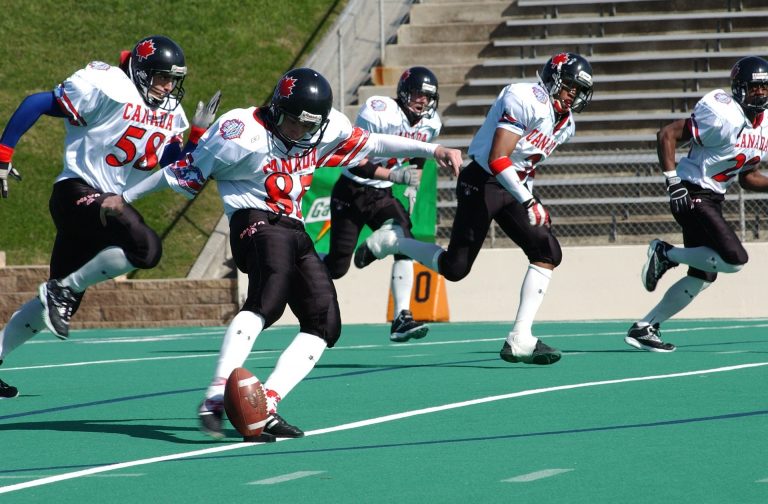Breaking News
- 3 years ago
- WHERE THE WILDWAYS ARE
- 3 years ago
- They Call It Worm. They Call It Lame. That’s Not Its Name.
- 3 years ago
- Climate of Change Episode 4: ‘Rewiring the Future’ Review
- 3 years ago
- The Playbook for Progress Homepage
- 3 years ago
- Climate of Change Episode 3: “Faith, Hope, and Electricity” – A Review
Captain Community
Leads change by empowering eNGOs
Written by Greta Vaivadaite
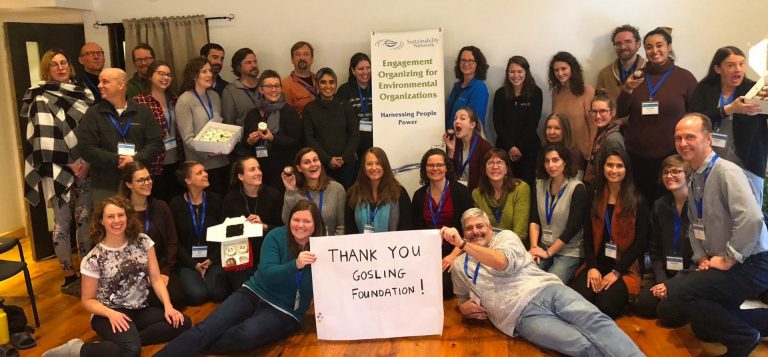
Paul Bubelis is the Executive Director of the Sustainability Network, which he co-founded in 1997. He is a founding Director of Green Economy Canada and sits on advisory committees for Ontario Nonprofit Network, the Masters in Conservation Leadership program at the University of Guelph and the Green Economy Bridging Program Advisory Council at Ryerson University. Prior to his work at Sustainability Network, he served as Executive Director of the Ontario Environment Network and spent 5 years at Environment Canada managing a province-wide funding program. He has also consulted grantmakers, government and NGOs. Paul obtained a biology degree from the University of Guelph, attended the University of Victoria and has a MSc from the University of Toronto.
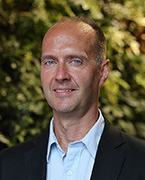
He shoots, he scores. Meet Paul Bubelis, an environmental veteran who belongs in the Green Hall of Fame – and his trophy case would feature a few medals and awards that he acquired along the way during the course of his long-haul game against climate change.
And it’s not always easy being a do-gooder in a world that is constantly appearing to be falling apart. While a vision, hard work, and persistence (and the odd bit of luck) is the typical ‘secret sauce’ to victory and triumph, it can often feel like it is not enough when the world is beginning to change exponentially in a variety of aspects, feeling like you’re always skating with the ice tilted against you.
As someone who is in the beginning stages of my environmental career journey, I often have a hard time imagining how it is being in this field long-term. Stepping into a sector that is emotionally charged, how does one stay in it, let alone navigate those waters all while keeping the organization and sanity afloat with you? A parallel that I discovered between Mr. Bubelis and I is that although the many challenges faced, emotions felt, and passion is fueled within your career – it just makes the wins that much more sweeter when they do happen.
Join me below with Paul’s pep-talk as the coach of the environmental world to all the young players in the starting lineup.
Greta Vaivadaite for A\J: What are the main struggles that NGOs are facing today, from your perspective?
PB: Environmental NGOs’ major struggle are the dual crises of climate and biodiversity. So that’s what they work on, around the clock, and that’s top of mind all the time. But a bit outside that are, what I call the host of political, social and economic pressures that we all operate under. The top of my list: political polarization, weak adherence to norms and institutions, and COVID of course. That could be both an opportunity for advocacy as far as eNGOs goes, such as “build back better”, as all climate stipulations, on infrastructure spending. In a sense, looking for a silver lining, it can be kind of an opportunity. Apart from all the policies; how to electrify, how to contribute to reconciliation, inclusion from the point of view for who is involved in the eNGO community, and that is youth, indigenous reconciliation, and people of colour. The racial reckoning that came to the fore with the black lives matter movement last year, has particular resonance for the eNGO world, there are challenges on that front, that’s for sure. The last is, relevance, staying relevant in between the big and the small emerging NGOs, and trust – trust of donors, trust of government, trust of corporate leaders. The WE charity controversy is top of mind and that is going to have ramifications for the charitable sector, including eNGOs. When there is a scandal in the charitable sector, everyone by association suffers. Some more than others.
GV: Tell me about how you got here? How did you sustain yourself for over 23 years in the environmental field without backing down?
PB: It’s close to 30 now, if you count 5 years of government, two years of contracting and consulting, and 23 with the Sustainability Network. I had persistence but work/life balance, if your day job is environmental, it can be all consuming. A lot of people say if you work in the environmental field, it’s about existence or survival, it can be heavy and daunting and emotionally draining for sure. But you just have to stay grounded for the long haul, and don’t burn out, which is a personal thing, but also for the good of any organization you are working for and for the sector. If you are in this for the long haul you’ve got to take care of yourself. You have to stay healthy yourself – family, physical hobbies, I do it through music and novels. Whatever it takes to center yourself and step away occasionally, because if the environmental mission becomes your 24/7 focus – you’re not going to last. No human can take on that weight.
“If you are in this for the long haul you’ve got to take care of yourself.”
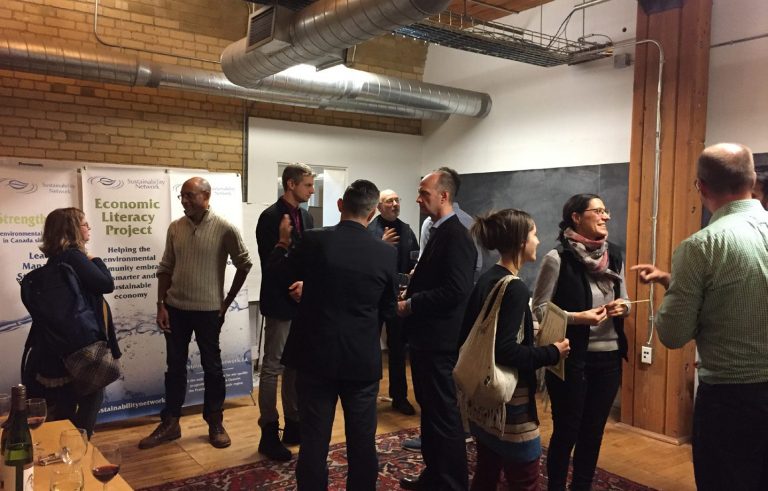
GV: It is often easy to steer away from the “do good” mission we often set for ourselves as young graduates who want to take on the world, how do you not sell out somewhere along the way?
PB: Mindsets matter. I remember when I was in high school, there were some people who wanted to strike it rich and acquire everything in sight materialistically and write a cheque to some charity i.e. chequebook philanthropy. But that is not a sustainable thing. Have a plan, be thoughtful but be flexible, the trick is to recognize creativity and a great idea, and a great collaborator. How Sustainability Network came about is that I was able to spot that empty niche, and again – collaborators are really important, you got to surround yourself with big thinkers but realistic thinkers, people who can make stuff happen. It’s rarely about what one person does but usually about what collaboration and a collection of people can do if aligned. Be around greatness if you can and surround yourself with like-minded people. Work together with others as you try to achieve your objectives. Focus on impact. Without sounding too hokey – it’s about making the world a better place.
GV: What would you define in your eyes as “good work”?
PB: Half the globe spends most of their day putting food on the table and securing shelter. A lot of people are subsistence, and don’t give a lot of thought to what good work is. They’re focused on the bottom of Maslow’s hierarchy, which is to survive at its most basic sense. It’s a privilege to make a living by doing what your brain and your heart say is right. Many people don’t even enter into that headspace, they’re all about survival. Every living thing depends on the environment and society is how, we as a species, organize ourselves, then the economy is this kind of construct that just serves that society, but it’s all dependent on Mother Earth so you’ve just gotta get that order of priorities right. There is some sniping, there’s some competition in the NGO world but ultimately people form a bit of a family. And if you’ve been in that community for 10 – 20 years, you have serious relationships with a lot of people across the country who are focused on the same issues. There is a good collegiality that bends towards a warmth – it’s an alignment of visions, and, the reason we do the work we do.
“It’s rarely about what one person does but usually about what collaboration and a collection of people can do if aligned.”
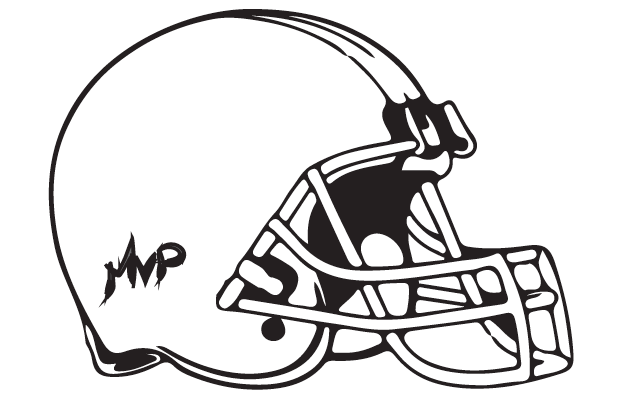
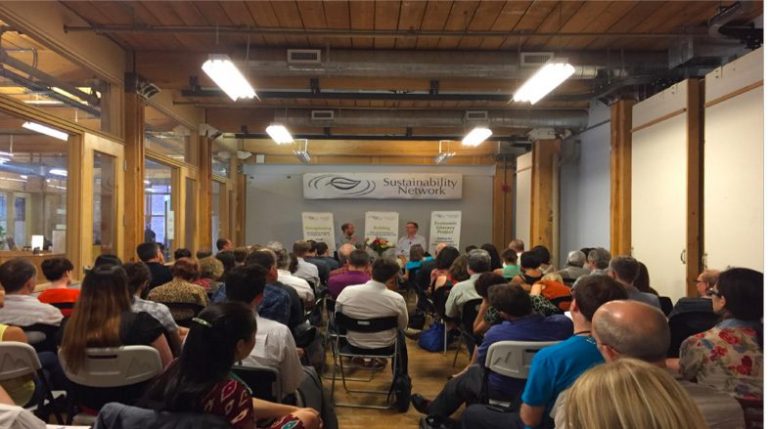
GV: If you could rewind time, what is some wisdom you could share with early-twenty-something Paul Bubelis?
PB: Engage or/and volunteer with an NGO. I’d say that to all the new grads trying to break into the ENGO community or mid-career folks who are ‘bridging’ in. I would say “check them out”, to see what their values are like. And no better way to do that, than putting your hand up and either doing some event volunteering or something along those lines.
Also, be careful with cynicism and skepticism. Skepticism is okay, and as a scientist it’s healthy and kind of a requirement. But that can kind of segue into cynicism, which can be debilitating and disempowering.
If you’re in the NGOs community, you’re going to have more losses than wins. And I think that’s what sometimes has people tend towards cynicism as the losses mount. You have to resist that temptation because it takes stamina and positivity to stick with the work and ultimately, it’s the only way forward. Persistence and hard work, but at the same time, celebrate the victories, however small they are along the way.
GV: What were some highlights or shall I say trophy worthy moments of your life in the environmental seat? What about the time outs? The penalties? The losses? What did you learn among these moments?
PB: The ups are mostly personal in nature. We live in a healthy, wealthy democracy, supported by a healthy family both literally (my wife, kids and dogs) and figuratively, among my colleagues. As an entrepreneur you have to get used to having doors slammed in the face before something does blossom.
I don’t know if I have that sort of thick skin but I’ve just been fortunate that most of the things I’ve been involved with have at least been somewhat successful. The downs are more about the end game. Personally and professionally, I sometimes feel like our issues are on a treadmill moving backward. So, the frustration of one step forward, two steps back. Anyone working on these issues’ day after day for decades, can see that. The coming ecological crisis, species collapse, temperatures, ocean currents, mass migrations, political instability – it can all paint a fairly depressing picture. All you can do is control what’s in your bubble. The highlights, the milestones along the way are important and you have to remember to celebrate. But you can’t rely on the celebrations to motivate you – that has to come from within and the satisfaction of contributing to the greater good. The highlights are nice – who wouldn’t want the trophy or the ring – but it’s the recognition of your colleagues and especially the fire inside you that keeps you going.
An analogy that comes to mind when thinking about campaigns is the strategy of a football coach on the sidelines. Sometimes you’re on defence, other times offence, sometimes you need to be conservative and sometimes take a big risk. It all depends on timing, need and the opportunity. The sports analogy only goes so far though as the stakes are so much higher in our work – when we lose climate change increases, there’s an extinction etc. When we do lose a campaign all you can do is a post mortem, find out what happened and why. Let this inform your next strategy, the next campaign. There might be more losses than wins, but all you can do is understand them, and move on to the next fight.

“All you can do is control what’s in your bubble. The highlights, the milestones along the way are important and you have to remember to celebrate.”
While it shows that not every victory is made through power plays, it is often those moments of small victories that make the journey worth it. Feeling disempowered? Don’t throw in the towel just yet, there is still work to be done and a society to transform. We need all the players and teammates we can get in order to stand united against the offense. It’s people like Paul who show their MVP status to the cause and the community, by moving the dial even just a smidge more as we keep training our green teams. The team of people who share the vision of a better world coming together, while at times it may not feel like it – with the same shared vision you are a team united by cause. As with all games, no one wins them all, but enjoying the goals and taking moments to do a little victory dance along the way sure makes it worth it.
